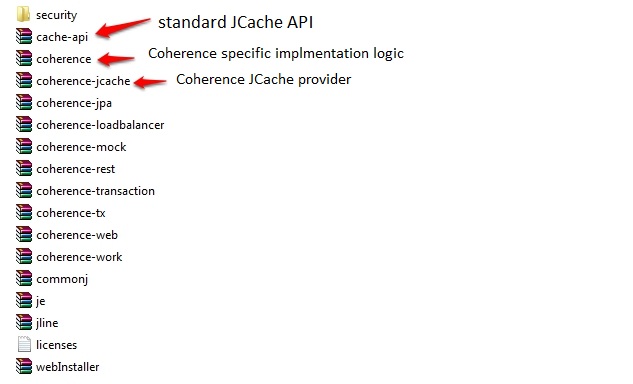Sneak Peek into the JCache API (JSR 107)
Join the DZone community and get the full member experience.
Join For FreeThis post covers the JCache API at a high level and provides a teaser – just enough for you to (hopefully) start itching about it ;-)
In this post ….
- JCache overview
- JCache API, implementations
- Supported (Java) platforms for JCache API
- Quick look at Oracle Coherence
- Fun stuff – Project Headlands (RESTified JCache by Adam Bien) , JCache related talks at Java One 2014, links to resources for learning more about JCache
What is JCache?
JCache (JSR 107) is a standard caching API for Java. It provides an API for applications to be able to create and work with in-memory cache of objects. Benefits are obvious – one does not need to concentrate on the finer details of implementing the Caching and time is better spent on the core business logic of the application.
JCache components
The specification itself is very compact and surprisingly intuitive. The API defines high level components (interfaces) some of which are listed below
- Caching Provider – used to control Caching Managers and can deal with several of them,
- Cache Manager – deals with create, read, destroy operations on a Cache
- Cache – stores entries (the actual data) and exposes CRUD interfaces to deal with the entries
- Entry – abstraction on top of a key-value pair akin to a java.util.Map
JCache Implementations
JCache defines the interfaces which of course are implemented by different vendors a.k.a Providers.
- Oracle Coherence
- Hazelcast
- Infinispan
- ehcache
- Reference Implementation – this is more for reference purpose rather than a production quality implementation. It is per the specification though and you can be rest assured of the fact that it does in fact pass the TCK as well
From the application point of view, all that’s required is the implementation to be present in the classpath. The API also provides a way to further fine tune the properties specific to your provider via standard mechanisms.
You should be able to track the list of JCache reference implementations from the JCP website link
public class JCacheUsage{
public static void main(String[] args){
//bootstrap the JCache Provider
CachingProvider jcacheProvider = Caching.getCachingProvider();
CacheManager jcacheManager = jcacheProvider.getCacheManager();
//configure cache
MutableConfiguration<String, Integer> jcacheConfig = new MutableConfiguration<>();
jcacheConfig.setTypes(String.class, MyPreciousObject.class);
//create cache
Cache<String, MyPreciousObject> cache = jcacheManager.createCache("PreciousObjectCache", jcacheConfig);
//play around
String key = UUID.randomUUID().toString();
cache.put(key, new MyPreciousObject());
MyPreciousObject inserted = cache.get(key);
cache.remove(key);
cache.get(key); //will throw javax.cache.CacheException since the key does not exist
}
}JCache provider detection
- JCache provider detection happens automatically when you only have a single JCache provider on the class path
- You can choose from the below options as well
//set JMV level system property
-Djavax.cache.spi.cachingprovider=org.ehcache.jcache.JCacheCachingProvider
//code level config
System.setProperty("javax.cache.spi.cachingprovider","org.ehcache.jcache.JCacheCachingProvider
//you want to choose from multiple JCache providers at runtime
CachingProvider ehcacheJCacheProvider = Caching.getCachingProvider("org.ehcache.jcache.JCacheCachingProvider");
//which JCache providers do I have on the classpath?
Iterable<CachingProvider> jcacheProviders = Caching.getCachingProviders();Java Platform support
- Compliant with Java SE 6 and above
- Does not define any details in terms of Java EE integration. This does not mean that it cannot be used in a Java EE environment – it’s just not standardized yet.
- Could not be plugged into Java EE 7 as a tried and tested standard
- Candidate for Java EE 8
Project Headlands: Java EE and JCache in tandem
- By none other than Adam Bien himself !
- Java EE 7, Java SE 8 and JCache in action
- Exposes the JCache API via JAX-RS (REST)
- Uses Hazelcast as the JCache provider
- Highly recommended !
Oracle Coherence
This post deals with high level stuff w.r.t JCache in general. However, a few lines about Oracle Coherence in general would help put things in perspective
- Oracle Coherence is a part of Oracle’s Cloud Application Foundation stack
- It is primarily an in-memory data grid solution
- Geared towards making applications more scalable in general
- What’s important to know is that from version 12.1.3 onwards, Oracle Coherence includes a reference implementation for JCache (more in the next section)
JCache support in Oracle Coherence
- Support for JCache implies that applications can now use a standard API to access the capabilities of Oracle Coherence
- This is made possible by Coherence by simply providing an abstraction over its existing interfaces (NamedCache etc). Application deals with a standard interface (JCache API) and the calls to the API are delegated to the existing Coherence core library implementation
- Support for JCache API also means that one does not need to use Coherence specific APIs in the application resulting in vendor neutral code which equals portability
How ironic – supporting a standard API and always keeping your competitors in the hunt ;-) But hey! That’s what healthy competition and quality software is all about ! - Talking of healthy competition – Oracle Coherence does support a host of other features in addition to the standard JCache related capabilities.
- The Oracle Coherence distribution contains all the libraries for working with the JCache implementation
- The service definition file in the coherence-jcache.jar qualifies it as a valid JCache provider implementation
Curious about Oracle Coherence ?
- Quick Starter page
- Documentation
- Installation
- Further reading about Coherence and JCache combo – Oracle Coherence documentation
JCache at Java One 2014
Couple of great talks revolving around JCache at Java One 2014
- Come, Code, Cache, Compute! by Steve Millidge
- Using the New JCache by Brian Oliver and Greg Luck
Hope this was fun :-)
Cheers !
Published at DZone with permission of Abhishek Gupta, DZone MVB. See the original article here.
Opinions expressed by DZone contributors are their own.





Comments